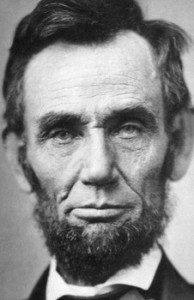Notable, quotable State of the Union speech lines that Lincoln wrote (but never spoke)
 Speakers and speechwriters can learn a few tricks by tuning in to the President’s annual State of the Union speech Tuesday. Important speeches like these often deliver up colorful, memorable – often historic – lines and can inspire us to do the same whenever we write and give a speech.
Speakers and speechwriters can learn a few tricks by tuning in to the President’s annual State of the Union speech Tuesday. Important speeches like these often deliver up colorful, memorable – often historic – lines and can inspire us to do the same whenever we write and give a speech.
Abraham Lincoln is widely considered a master of oratory for his 272-word Gettysburg Address, dubbed “the great American poem” by poet Carl Sandburg. But what about his State of the Union addresses?
Lincoln himself never delivered his own State of the Union speeches. Back then, “the President’s Annual Message to Congress,” as it was called, was a written report given to Congress and read by a clerk at the end of the year, in December. Nevertheless, Lincoln’s messages (which he penned himself) had the rhythm, rhyme and rhetorical devices that make for memorable lines – precursors to big ideas that can incite a movement and change a nation.
Here are some notable, quotable lines from Lincoln’s four State of the Union addresses in 1861, 1862, 1863 and 1864.
“It has been said that one bad general is better than two good ones …. In a storm at sea no one on board can wish the ship to sink, and yet not unfrequently all go down together because too many will direct and no single mind can be allowed to control.” (Dec. 3, 1861)
“This is the just and generous and prosperous system which opens the way to all, gives hope to all, and consequent energy and progress and improvement of condition to all.” (Dec. 3, 1861)
“The struggle of today, is not altogether for today – it is for a vast future also. With a reliance on Providence, all the more firm and earnest, let us proceed in the great task which events have devolved upon us.” (Dec. 3, 1861)
“And while it has not pleased the Almighty to bless us with a return of peace, we can but press on, guided by the best light He gives, trusting that in His own good time, and wise way, all will yet be well.” (Dec. 1, 1862)
“We have attempted no propagandism and acknowledged no revolution.” (Dec. 1, 1862)
“Fellow-citizens, we cannot escape history. We of this Congress and this administration, will be remembered in spite of ourselves. No personal significance, or insignificance, can spare one or another of us. The fiery trial through which we pass, will light us down, in honor or dishonor, to the latest generation.” (Dec. 1, 1862)
“In giving freedom to the slave, we assure freedom to the free – honorable alike in what we give, and what we preserve. We shall nobly save, or meanly lose, the last best, hope of earth.” (Dec. 1, 1862)
“The way is plain, peaceful, generous, just – a way which, if followed, the world will forever applaud, and God must forever bless.” (Dec. 1, 1862)
“The dogmas of the quiet past, are inadequate to the stormy present. The occasion is piled high with difficulty, and we must rise – with the occasion. As our case is new, so we must think anew, and act anew. We must disenthrall ourselves, and then we shall save our country.” (Dec. 1, 1862)
“In times like the present, men should utter nothing for which they would not willingly be responsible through time and eternity. (Dec. 1, 1862)
“It is easy to see that, under the sharp discipline of civil war, the nation is beginning a new life.” (Dec. 8, 1863)
“While it is melancholy to reflect that the war has filled so many graves and carried mourning to so many hearts, it is some relief to know that, compared with the surviving, the fallen have been so few.” (Dec. 6, 1864)
“The national resources, then, are unexhausted, and, as we believe, inexhaustible. The public purpose to reestablish and maintain the national authority is unchanged, and, as we believe, unchangeable.” (Dec. 6, 1864)

















